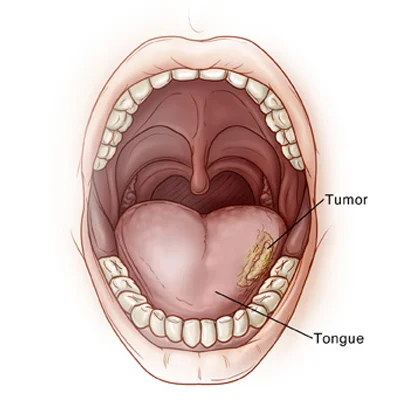
Cancer that occurs on the tongue can be found either on the anterior end(oral end) of the tongue or the posterior end (base of the tongue). The anterior having 4 parts tip, dorsum, lateral borders, and ventral surface out of which the lateral borders get affected by a tumor in most cases. Oral cancer is found out during the initial stages but it is quite advanced when it spreads to the base of the tongue
Stages of Tongue Cancer
The 5 stages of tongue cancer can help the patient plan out his treatment accordingly.
- Stage 0: known as Carcinoma in-situ. This describes the presence of abnormal cells in the surface lining and having a high potential to invade the deeper layers.
- Stage 1: The size of the tumor is less than or equal to 2 centimeters and the cancer cells did not spread to the lymph nodes.
- Stage 2: The size of the tumor is between 2 and 4 centimeters and the cancer cells did not spread to the lymph nodes.
- Stage 3: The tumor is larger than 4cm and without spreading to lymph nodes, or is of any size and had spread to only a single lymph node(less than 3cm).
- Stage 4: It is the most advanced stage. The tumor may be of any size, but it has spread to: Adjacent tissue, skin, or bone. Single lymph node (more than 3cm) or multiple lymph nodes. Distant body parts like lungs etc.
Symptoms of Tongue Cancer :
- Ulceration or lump on the tongue
- Bleeding and numbness
- Reddish or White patches on the tongue
- Lump in the neck
- Pain and difficulty in swallowing
Causes and Risk Factors of Tongue Cancer
Excessive Consumption of Tobacco and Alcohol is the biggest risk factor for tongue cancer. The cancers that are found on the base of the tongue are due to the presence of HPV-16. Chronic irritation by dentures, teeth and poor dental hygiene is another reason for tongue cancer.
Diagnosing Tongue Cancer
- A complete medical history and the patient's history of tobacco and alcohol consumption will help in diagnosis
- Fiber Optic Endoscope is employed to locate any abnormal growth or ulcers on the base of the tongue.
- The biopsy is another way to detect Tongue cancer as it removes a cell or a part of the infected portion to examine it closely. The biopsy varies from condition to condition.
- Neck biopsy will be done if only a bump on the neck is observed
- The complexity and the in depth analysis of the growth will be known through X-rays, CT-Scans and MRI Scans.
Treatment of Tongue Cancer
- The treatment goals of tongue cancer are to eradicate the cancer and restore the form and function of the tongue.
- The treatment modality for achieving these goals in tongue cancer is usually surgery. In case of advanced cancer, surgery should be followed by adjuvant radiotherapy and chemotherapy either alone or in combination.
- The choice of treatment depends on the depth, extent and stage of the tongue cancer.
- Surgery to remove a part of the tongue is known as partial glossectomy whereas advanced cases needed larger tissue removal.
- People with large tissue removal may need a reconstructive surgery to restore the form and function.
Preventing tongue cancer
- Refrain from smoking and consuming any tobacco products.
- Avoid excess drinking of alcohol
- Regular dental check-ups and maintaining good oral hygiene.
- Take a balanced diet rich in fruits, vegetables, Vitamins A, C and E.
Management Of Tongue Cancer
- These are aggressive with early tendency to spread to neck nodes.
- Also they have tendency to relapse after treatment.So early and aggressive treatment ensure cure.
- Following patient presented with non healing ulcer since 2 months.
- Associated with severe pain and earache and neck nodal swellings.
- DIAGNOSIS- Biopsy is done to confirm diagnosis
- IMAGING-CT scan or MRI is done to stage the disease.
Treatment
- Early stage disease is treated with surgery.
- Advanced stagewith multi modality treatment - surgery + radiotheraphy+/-chemotheraphy.
What to expect post surgery
After sinus cancer surgery, patients can expect a recovery period of several weeks to months, depending on the extent of the surgery and the individual's overall health. Here are some general things to expect after sinus cancer surgery:
- Patients may experience swelling, bruising, or tenderness around the surgical site and pain medications would be prescribed to help manage the pain & discomfort
- Nasal congestion and drainage are common after sinus surgery, and patients may need to use saline sprays or irrigations to help keep the sinuses moist and clear.
- Patients may need to follow a soft or liquid diet for a few days after surgery, and may need to avoid strenuous activity or heavy lifting for several weeks.
- Patients will need to schedule follow-up appointments with their healthcare provider to monitor their recovery and to check for any signs of recurrence.
- Patients may need to work with a physical therapist or speech therapist to help regain strength, mobility, or function following surgery
Risks associated with the surgery
As with any surgery, there are risks associated with sinus cancer surgery. Here are some potential risks associated with sinus cancer surgery:
- There is a risk of bleeding during or after surgery
- Sinus surgery can increase the risk of infection
- Surgery can damage nearby structures, such as the eyes or brain, which can cause vision problems, headaches, or other neurological symptoms.
- Sinus surgery can damage the olfactory nerves, which can result in a loss or change of smell.
- Surgery may result in swelling or inflammation that can make it difficult to breathe through the nose.
- There is a small risk of complications such as allergic reaction or adverse reaction to the anesthesia medication.
